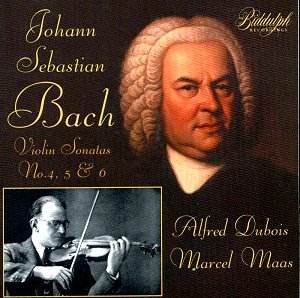AVAILABILITY
www.biddulphrecordings.com
Collectors have good reason to be grateful to
Biddulph for this release. Alfred Dubois is remembered today,
if at all, as the teacher of Arthur Grumiaux and less as a superb
stylist and violinist in his own right. Thus the release of this
Dubois disc, graced by the artistry of pianist Marcel Maas, makes
it a valuable addition to the list of violinistic reissues. Dubois
was born in 1898 and studied in Brussels. After leaving the Conservatoire
he studied with Ysaÿe between the years 1917 and 1920, won
prestigious competitions and teamed up in a sonata duo with Maas.
The 1920s and 1930s were his heyday, culminating in the professorship
in Brussels in 1927, in succession to his erstwhile mentor Ysaÿe.
At thirty he was now the pre-eminent Belgian soloist, touring
America and recording and forming, during the war, his own quartet
(with pupil Grumiaux as second violin) – they refused to play
for the occupying Germans. His sudden death at the early age of
fifty-one came as a terrible blow.
Dubois, like Szymon Goldberg, is a connoisseur’s
violinist. His performances of the Franco-Belgian repertoire are
real benchmarks of stylistic acumen and expressive judgement.
Only slightly less so are these Bach recordings. His tone is one
of great purity and refinement with a generally medium paced vibrato
and subtle, not overuse, of portamento and ritardando. He makes
successive portamenti in the Adagio of the C minor but that is
one of the few instances where the device feels unrelieved but
he sustains the Adagio of the F minor with heroic nobility, as
he does the Largo second movement of No 6. Technically he is eloquent
– when there are problems it is usually a matter of finger slip
or intonational buckle, as in the Andante of the Sonata in A (the
only movement they recorded of that work). If I have reservations
at all about his Bach playing they centre on a certain immobility;
whilst the gravity, lyricism and intellectual profundity of his
playing are not in doubt there are moments when I wished for a
greater motoric sense, not least to act as a contrastive device.
But these are otherwise most distinguished performances. Coupled
with them is Maas’s solo Bach. The Toccata in C minor receives
a reading distinguished by superb voicings, colour and vivacity,
by well-sprung internal rhythms and by calibrated dynamics – buoyant
and imaginative Bach playing.
Biddulph have utilised very clean copies of the
78s and there is no competition for these 1933 recordings. Dubois
deserves nothing but the best in restoration and he gets it handsomely
in this excellent release.
Jonathan Woolf
